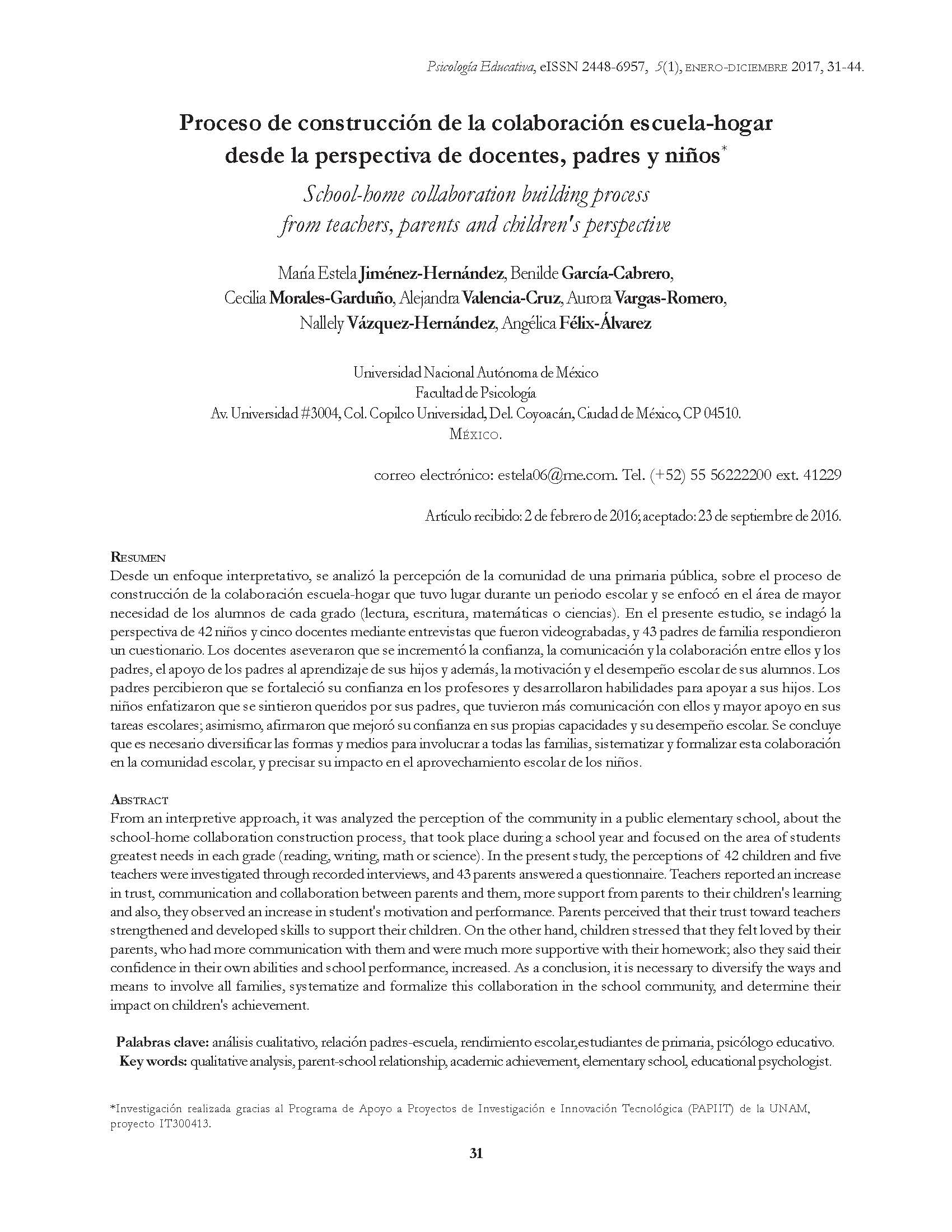Abstract
From an interpretive approach, it was analyzed the perception of the community in a public elementary school, about the school-home collaboration construction process, that took place during a school year and focused on the area of students greatest needs in each grade (reading, writing, math or science). In the present study, the perceptions of 42 children and five teachers were investigated through recorded interviews, and 43 parents answered a questionnaire. Teachers reported an increase in trust, communication and collaboration between parents and them, more support from parents to their children's learning and also, they observed an increase in student's motivation and performance. Parents perceived that their trust toward teachers strengthened and developed skills to support their children. On the other hand, children stressed that they felt loved by their parents, who had more communication with them and were much more supportive with their homework; also they said their confidence in their own abilities and school performance, increased. As a conclusion, it is necessary to diversify the ways and means to involve all families, systematize and formalize this collaboration in the school community, and determine their impact on children's achievement.
References
Bronstein, P., Ginsburg, G. S., y Herrera, I. S. (2005). Parental Predictors of Motivational Orientation in Early Adolescence: A Longitudinal Study. Journal of Youth & Adolescence, 34(6), 559-575.
Bronfenbrener, U. (2005). Making human beings human: Bioecological perspectives on human development. Thousand Oaks, CA: Sage.
Carter, H. M. (2013). Creating effective community partnerships for school improvement. A guide for school leaders. New York: Taylor & Francis, p. 14.
Coleman, M. (2013). Empowering family-teacher partnerships. Building connections within diverse communities. Thousand Oaxs: Cal. Sage Publications Inc.
Denzin, N. K., y Lincoln, Y. S. (2011). The discipline and practice of qualitative research.En N. K. Denzin y Y.
S. Lincoln (Eds.), Handbook of qualitative research (2a ed., pp. 1-19). Thousand Oaks, CA: Sage.
Epstein, J. L. (2001). School and family partnerships: Preparing educators and improving schools. Boulder: Westview.
Epstein, J. L. (2011). School, family, and community partnerships: Preparing educators and improving schools. Boulder, CO: Westview.
Fan, X., y Chen, M. (2001). Parental involvement and students' academic achievement: A meta-analysis. Educational Psychology Review, 13, 1-22.
Harkins, D. A. (2013).Beyond the Campus. Building a sustainable university-community partnership. Charlotte, NC. Information Age Publishing, Inc.
Henderson, A., y Mapp, K. (2002). A new wave of evidence: The impact of school, family, and community connections on student achievement. Austin: Southwest Educational Development Laboratory, National, Center for Family & Community Connections with Schools.
Hill, N., y Taylor, L. (2004). Parental school involvement and children's academic achievement: Pragmatics and issues. Current Directions in Psychological Science, 13, 161-164.
Iannaccone, A. (2013). Crossing boundaries. Towards a new view on cultural psychology of education. En
G. Marisco, K. Komatsu y A. Iannaccone (Eds.). Crossing boundaries. Intercontextual dynamics between family and school. Charlotte, N. C.: Information Age Publishing, Inc.
Jeynes, W. H. (2005). A meta-analysis of the relation of parental involvement to urban elementary school student academic achievement.Urban Education, 40, 237-269.
Jiménez, M. E. (1999). La Participación de los Padres. Una Alternativa de Prevención del Bajo Rendimiento Escolar. Integración. Educación y Desarrollo Psicológico. Revista del Instituto de Psicología y Educación de la Universidad Veracruzana, 11, enero-junio, 40-48.
Jiménez, M. E., y Macotela, S. (2008). Una escala para evaluar la motivación de los niños de primaria hacia el aprendizaje. Revista Mexicana de Investigación Educativa, 3(37), 599-623.
Jiménez, M. E., Ito, E., y Macotela, S. (2010). El papel de las madres en la motivación de sus hijos hacia el aprendizaje escolar". Revista Mexicana de Investigación en Psicología Educativa, 1(1), 59-74.
Lichtman, M. (2013). Qualitative research in education. A user´s guide. 3ª ed. Los Angeles: Sage.
Lincoln, Y. S., Lynham, S. A., y Guba, E. G. (2011). Paradigmatic controversies, contradictions, and emerging confluences, revisited. En N. K. Denzin y Y.
S. Lincoln (Eds.), Handbook of qualitative research (2ª ed.), Thousand Oaks, CA: Sage,pp. 97-127.
Murray, S. M., O'Brien, M., y O'Campo, P. J. (2008). School adjustment in the early grades: Toward an integrated model of neighborhood, parental, and child processes. Review of EducationalResearch, 78(1), 3-32.
Organización para la Cooperación y Desarrollo Económico (2016). Programa para la evaluación internacional de alumnos (PISA). PISA 2015 - Resultados. Recuperado el 17 de octubre de 2017 enhttp://www.oecd.org/pisa/PISA- 2015-Mexico-ESP.pdf
Sánchez, P. A., Valdés, A. A., Reyes, N. M., y Martínez, E.
A. (2010). Participación de padres de estudiantes de educación primaria en la educación de sus hijos en México. LIBERABIT, 16(1), 71-80.
Secretaría de Educación Pública (2014). ENLACE: Resultados históricos 2006-2014, Distrito Federal. Recuperado el 6 de septiembre de 2016 en http:// www.enlace.sep.g ob.mx/resultados_historicos
_por_entidad_federativa/
Seginer, R. (2006). Parents' Educational Involvement: A Developmental Ecology Perspective. Parenting: Science and Practice, 6(1), 1-48.
Senge, P. N. (2006). The fifth discipline.The art and practice of the learning organization. New York: Currency Doubleday Inc.

This work is licensed under a Creative Commons Attribution-NonCommercial-NoDerivatives 4.0 International License.
Copyright (c) 2024 Universidad Nacional Autónoma de México


